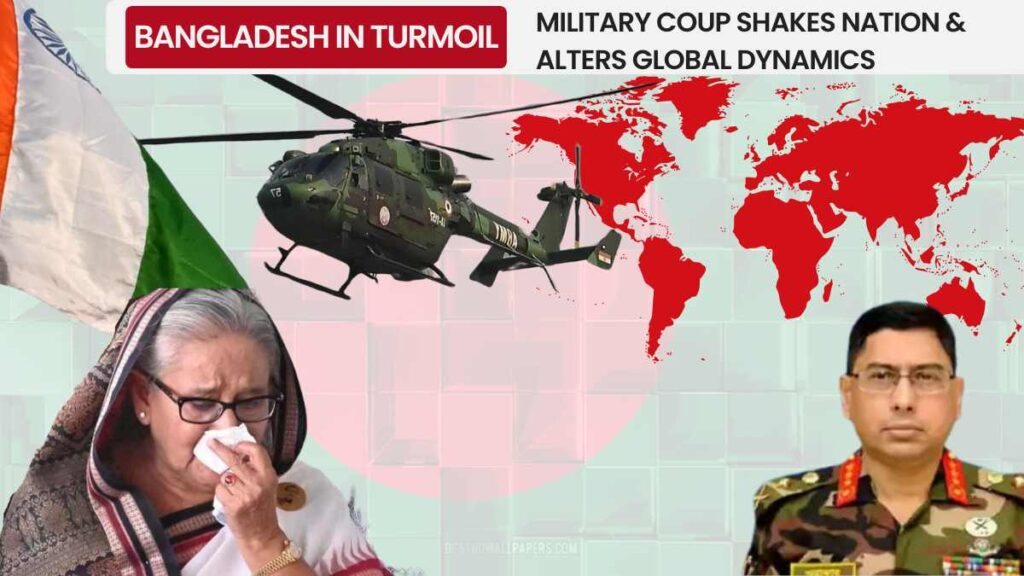In a surprising turn of events, Bangladesh has undergone a dramatic Bangladesh military coup, shaking the political landscape of the nation and drawing global attention. The military takeover has resulted in the removal of Prime Minister Sheikh Hasina from power, raising questions about the future direction of Bangladesh and its international relationships. This Bangladesh military coup comes amidst protests and political tension that have been simmering since the beginning of 2024.
Background: The Political Climate Leading to the Coup
The political unrest in Bangladesh began with the national elections held in January 2024. Sheikh Hasina, who has served as the Prime Minister for three terms, was re-elected for a fourth term amid allegations of election rigging. These allegations were raised by local opposition parties and echoed by the United States, which openly criticized the election process.
The accusations of electoral fraud sparked protests across Bangladesh. Initially small in scale, these protests gained momentum as various political factions and citizens demanded transparency and accountability. The situation escalated further when reports emerged that a major Western power, allegedly the United States, had pressured Bangladesh to allow the establishment of a military base within its borders. Sheikh Hasina’s refusal to comply with these demands added fuel to the fire, as geopolitical tensions began to influence domestic politics.
The Catalyst: Controversial Quota System
The protests intensified with the Bangladesh High Court’s decision on June 5, 2024, to reinstate a controversial 30% reservation quota for the descendants of those who fought in Bangladesh’s 1971 War of Independence. This decision reversed the 2018 abolishment of the quota, sparking outrage among students and various civic groups. Demonstrations erupted nationwide, with protesters demanding the removal of the quota system, which they saw as outdated and unjust.
Despite the Supreme Court of Bangladesh later increasing merit-based employment to 97%, the protests continued. The focus shifted from the quota system to the broader demand for Sheikh Hasina’s resignation, accusing her of mishandling the situation and failing to address the people’s grievances.
The Military Takeover
Amidst the escalating unrest, the Bangladesh military intervened, citing the need to restore order and prevent further chaos. The army gave Sheikh Hasina a mere 45 minutes to resign and leave the country. Under immense pressure, she complied and sought refuge in India, where she was transported safely by helicopter.
In a televised address, the army chief declared himself in charge, assuring the nation that an interim government would be formed soon. This coup marks a significant shift in Bangladesh’s political landscape, raising questions about the military’s future role and its stance on international relations, particularly with India and the United States.
Implications for US-Bangladesh Relations
The Bangladesh military coup presents a complex challenge to US foreign policy. Sheikh Hasina, once a key ally of the United States, had seen relations deteriorate during her tenure due to allegations of election rigging and her refusal to comply with certain geopolitical demands. Her removal leaves a vacuum that could potentially alter the dynamics of US-Bangladesh relations.
The new military leadership’s stance towards the United States remains uncertain. While the US has historically advocated for democracy and civilian governance, its strategic interests in the region may prompt a pragmatic approach to engaging with the new regime. There are assumptions that the US might have supported protests against Hasina’s government and even aided the Bangladesh army chief in executing the coup. These are speculative claims, as no official press note from the US Senate or government has confirmed such involvement. The possibility of a US military base in Bangladesh, as previously speculated, could be revisited depending on the evolving political landscape.
Regional Impact and Geopolitical Considerations
The coup in Bangladesh is part of a broader trend of military influence in South Asia, with similar situations in Myanmar and Pakistan. This development underscores the fragility of democratic institutions in the region and highlights the geopolitical tug-of-war between major powers like the United States, China, and India. For India, Sheikh Hasina’s ousting is particularly significant. Under her leadership, Bangladesh maintained friendly ties with India, fostering cooperation on various economic and security issues. The change in leadership raises questions about the future of these bilateral relations and whether the new regime will maintain a pro-India stance. India might be compelled to take military action against the Bangladesh army chief to restore the situation, as otherwise, it could face an influx of millions of Hindu refugees infiltrating into India.
What’s Next for Bangladesh?
As Bangladesh transitions to military rule, several critical questions remain unanswered. Will the new leadership prioritize democratic reforms and hold free and fair elections? How will it navigate international relations, particularly with key players like the United States and India?
Furthermore, the coup raises broader questions about the role of external powers in shaping the political landscape of sovereign nations. Was this military takeover solely a response to domestic unrest, or were there geopolitical forces at play? The situation in Bangladesh serves as a reminder of the complex interplay between internal politics and international interests.
The Bangladesh military coup is a pivotal moment in the country’s history, with far-reaching implications for regional stability and global geopolitics. As the world watches closely, international actors must engage constructively with Bangladesh’s new leadership while advocating for the restoration of democratic governance.
What do you think about the Bangladesh military coup and its potential impact on global politics? How should the United States navigate its relationship with the new regime? Share your thoughts in the comments below.

